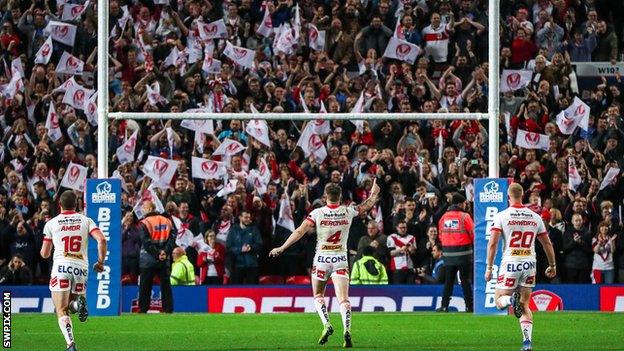Rugby Football League urges government rethink over fans returning to games
- Published

It is hoped fans may be allowed, in reduced numbers, to attend November's Super League Grand Final
Rugby Football League chief executive Ralph Rimmer has urged the government to reconsider plans to delay the return of crowds at games beyond 1 October.
Rimmer says the game is ready to host "socially-distanced, limited crowds".
He also highlighted the financial need for clubs to be able to welcome back fans with a potential impact on revenues of "up to £2m per week".
Football's Premier League have written to the government expressing concerns at the potential rethink.
On Wednesday, Prime Minister Boris Johnson said plans for spectators to attend sporting events in England from 1 October are to be reviewed after a rise in coronavirus cases.
"It is imperative that momentum is maintained in providing sports with a clear roadmap to first socially-distanced limited crowds," Rimmer said in a written address. "[Then] safely building to increased crowds.
"Rugby league is ready. Behind-closed-doors event management has been exemplary. All Super League clubs, with support from the RFL and Super League Europe, have worked exceptionally hard with local authority partners to complete all required plans for socially distanced crowds in their stadia.
"This includes supporting national track and trace, fan data management and health declarations, temperature testing plans and more. We have participated in the wider UK Sport/Department for Culture Media Sport pilot project and deployed all learnings to date in our sport's planning."
There have been several test events in other sports, including cricket, football and rugby union, and Rimmer says discussions around a pilot are "live" regarding a first dip of the toe for rugby league.
Coronavirus continues to have an impact on league, with positive tests forcing some Super League clubs to postpone recent games, and players to isolate.
Despite this, Catalans Dragons - based in Perpignan - will be the first club to play before a crowd in Saturday's game against Wigan, which is subject to French regulations.
Hopes that crowds will be allowed to attend the Challenge Cup semi-final and final, and the end of season Grand Final are still a possibility, subject to government approval,.
Games are currently 'centralised' at approved stadia to save on broadcaster costs, and allow them to be televised in the absence of fans, and the RFL continues to make use of the £16m loan provided by the government at the height of lockdown, to support the game.
"The financial losses to rugby league of not being able to admit fans is huge," Rimmer continued. "And it is mounting week on week. The impact on whole game revenues is up to £2m a week.
"This means jobs in both clubs and their local communities are at risk. It risks all the investment that the sport makes in participation, and in health and education projects which make such meaningful social impacts in our communities.
"Sport needs to drive its income and protect jobs through ticket sales and associated spend; and minimise the massive losses from this to date, and projected losses, and from the risks to commercial and sponsorship arrangements."